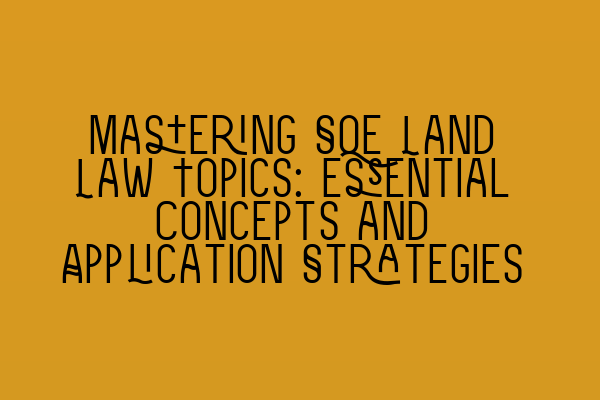Mastering SQE Land Law Topics: Essential Concepts and Application Strategies
Welcome to SQE Property Law & Land Law, your trusted solicitors specializing in property law and land law. In this blog post, we will dive deep into the world of SQE land law topics and discuss essential concepts and application strategies that will help you master this important subject. Whether you are a law student preparing for the SQE exams or a legal professional looking to enhance your knowledge, this article will provide you with valuable insights and guidance.
Before we delve into the specifics of land law, it is important to understand the purpose and significance of this area of law. Land law governs the rights and obligations relating to real property, which includes land and any structures or fixtures attached to it. It is essential for individuals, businesses, and even governments to have a clear understanding of land law in order to effectively manage and protect property rights.
Now, let’s explore some of the key concepts and topics that you need to master in SQE land law:
1. Estates and Interests: Understanding the different types of estates and interests in land is crucial. From freehold estates to leasehold estates, each type confers certain rights and responsibilities upon the parties involved. It is important to grasp the nuances of these estates and the legal implications they carry.
2. Co-ownership: Co-ownership of land occurs when two or more individuals jointly own a property. This concept involves understanding the various forms of co-ownership, such as joint tenancy and tenancy in common. You must be familiar with the rights and obligations of co-owners and the ways in which co-ownership can be terminated or modified.
3. Registered and Unregistered Land: Land can be registered or unregistered, and the rules governing each type differ. Understanding the Land Registration Act 2002 and its implications is crucial for dealing with both registered and unregistered land. Familiarize yourself with the registration process, priority rules, and the role of the Land Registry.
4. Landlord and Tenant Law: Landlord and tenant relationships are a key aspect of land law. You should be well-versed in the rights and obligations of both landlords and tenants, including aspects such as rent, repairs, termination of tenancies, and statutory protections for tenants.
5. Easements and Covenants: Easements grant specific rights over someone else’s land, while covenants impose certain obligations or restrictions on the use of land. Understanding the elements of valid easements and covenants, as well as their creation, enforceability, and impact on landownership, is essential.
6. Mortgages: Mortgages are a common way of financing property purchases. Knowledge of mortgage law, including the creation, enforcement, and discharge of mortgages, is vital. Understand the rights and responsibilities of both mortgagors and mortgagees and the implications of default or foreclosure.
Now that we have covered some of the essential concepts in SQE land law, let’s discuss a few application strategies that will help you excel in this subject:
1. Practice Exam Questions: Take advantage of SQE 1 practice exam questions to test your knowledge and gain valuable exam technique skills. Our article on SQE 1 Practice Exam Questions will provide you with resources and tips on how to best prepare for these exams.
2. Mock Assessments: Participating in mock assessments will help you simulate the exam environment and assess your readiness. Our article on SQE 1 Practice Mocks FLK1 FLK2 offers valuable insights into how mock assessments can enhance your preparation.
3. SQE 2 Preparation Courses: Our SQE 2 Preparation Courses are designed to provide you with comprehensive training on all aspects of land law and other relevant subjects. These courses will give you the necessary knowledge and skills to excel in the SQE exams.
4. SQE 1 Preparation Courses: If you are just starting your journey towards becoming a solicitor, our SQE 1 Preparation Courses will provide you with the foundational knowledge and skills required to tackle land law and other SQE subjects.
5. Stay Updated: Keep track of the latest developments in land law and stay informed about changes in legislation or case law. Being up to date will not only enhance your understanding of the subject but will also demonstrate your commitment to continuous learning.
At SQE Property Law & Land Law, we understand the challenges associated with mastering SQE land law topics. Our team of expert solicitors and legal professionals are here to provide you with the guidance and support you need. Contact us today for personalized assistance and let us help you achieve success in your SQE exams.
Remember, mastering SQE land law topics is not just about memorizing concepts; it’s about understanding their practical applications and being able to apply them in real-world scenarios. By following the essential concepts and application strategies outlined in this article, you will be well on your way to becoming a proficient land law practitioner.
For more information on SQE exams and related resources, check out our articles on SQE 1 Preparation Courses, SQE 2 Preparation Courses, and SRA SQE Exam Dates.
Thank you for choosing SQE Property Law & Land Law as your trusted source for all your property law and land law needs. Good luck with your studies and future legal career!
